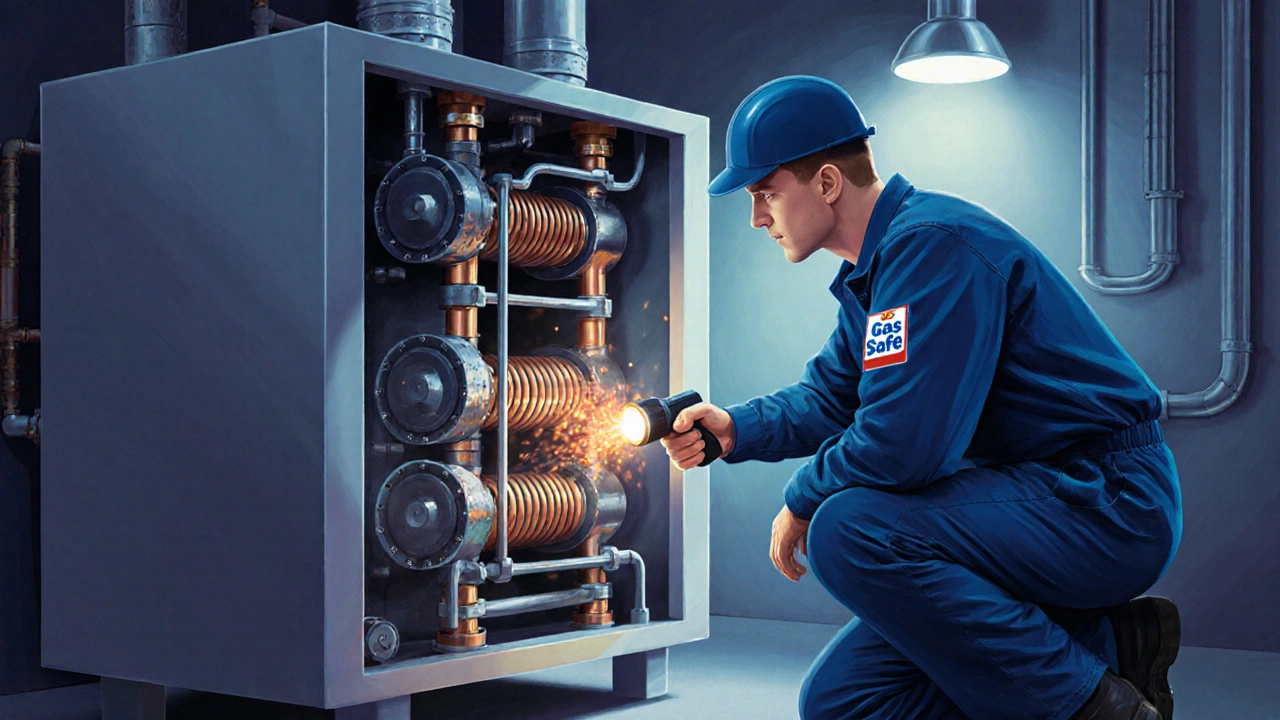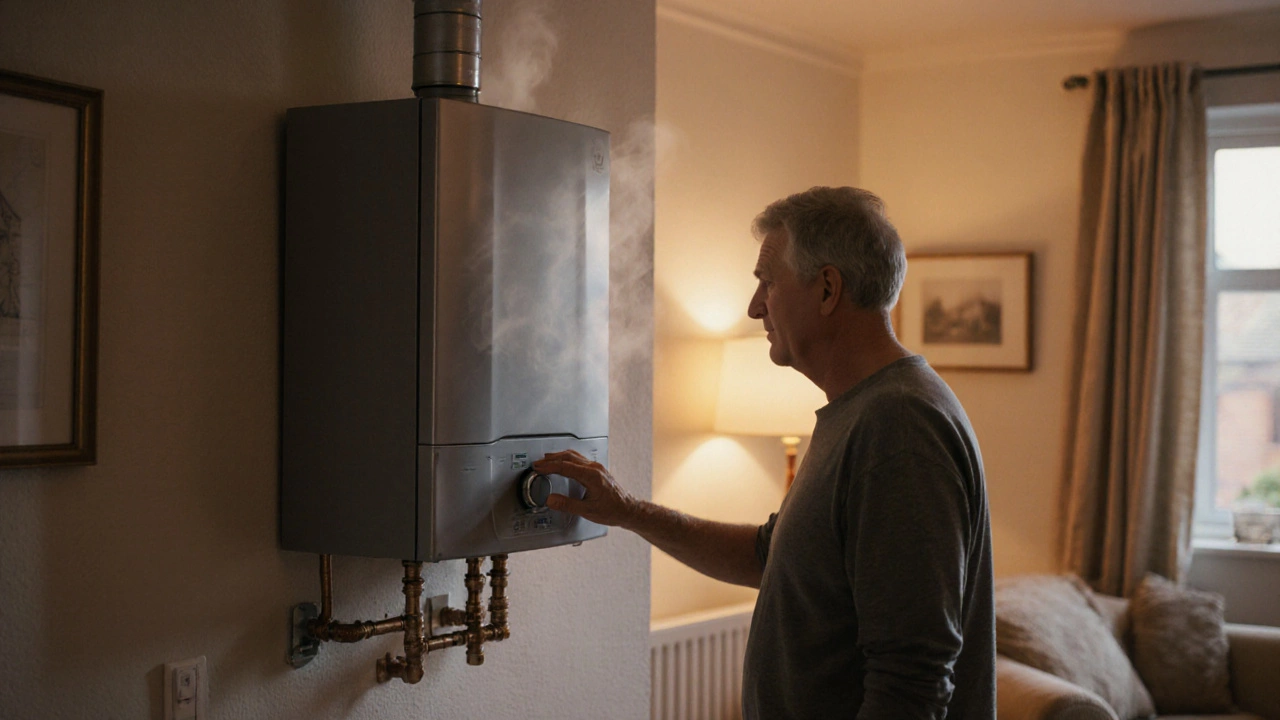Boiler Repair vs. Replace Decision Guide
Quick Decision Tool
Use this calculator to determine whether repairing or replacing your boiler is more financially beneficial.
Recommendation
Key Factors
- Age: -
- Efficiency: -
- Repair Cost: -
- Cost Ratio: -
When the radiator clicks and the hot water sputters, the first thought is often: "Should I fix it or buy a new boiler?" Deciding whether to repair a boiler isn’t just about the price tag on the invoice; it’s a mix of age, efficiency, recurring issues, and long‑term savings. This guide walks you through the exact questions to ask, the numbers to crunch, and the red flags that signal it’s time to start shopping for a replacement.
Key Takeaways
- Repair makes sense if the boiler is less than 10years old, the fix costs under 30% of a new unit, and efficiency is still above 85%.
- Replace the boiler when it’s over 15years old, repeatedly needs service, or its efficiency rating drops below 80%.
- A simple break‑even calculator shows you how many years of energy savings you need to offset the higher upfront cost of a new model.
- Choosing a certified technician with a solid warranty can save you up to 20% on future repair bills.
- Regular maintenance-cleaning the heat exchanger is the part that transfers heat from the gas flame to the water and checking the combustion system is the burner and venting that safely burn fuel and exhaust gases-can add 5‑10% more efficiency and delay costly failures.
boiler repair cost varies widely, but understanding the underlying factors helps you see past the headline price.
Understanding Boiler Lifespan
Boiler is a closed vessel that heats water to provide space heating and domestic hot water typically lasts 10‑15years, though high‑quality models can reach 20years with diligent care. Age alone doesn’t decide repair‑or‑replace; the key is how the boiler’s performance changes over time.
Manufacturers rate efficiency with an energy efficiency rating (often expressed as a percentage of fuel turned into usable heat). New condensing boilers hit 90‑95% while older non‑condensing units linger around 70‑80%. A drop in this rating means higher energy bills and more carbon emissions.
When Repair Makes Sense
Repair is the smarter move if:
- The boiler is under 10years old and still has a solid warranty.
- The issue is isolated-like a faulty thermostat, a leaking pressure valve, or a worn gasket-rather than systemic wear in multiple components.
- The quoted repair is the process of diagnosing and fixing a malfunctioning boiler costs less than about 30% of a comparable new unit.
- The efficiency rating remains above 85%, ensuring you’re not paying extra for energy waste.
Example: A 7‑year‑old condensing boiler develops a water leak in the pressure relief valve. A certified technician quotes $350 for the part and labor. A new comparable unit costs $4,500. Since $350 is only ~8% of the replacement price, fixing it is highly cost‑effective.

When Replacement Is Better
Consider a full replacement is installing a new boiler to take over heating and hot‑water duties when:
- The boiler is older than 15years and approaching the end of its design life.
- Repeated repairs-more than two major fixes in three years-signal chronic failure.
- Efficiency has slipped below 80%, making the unit a money‑drain on utility bills.
- The current model uses outdated fuel technology (e.g., oil or old‑style gas) that newer models have phased out.
Even though a new boiler’s upfront cost is higher, the combined savings from lower fuel consumption, fewer service calls, and newer warranties can pay off in 5‑7years.
Break‑Even Calculator
Here’s a quick way to see if a replacement pays off. Assume:
- Current annual heating bill: $1,200.
- New high‑efficiency boiler improves efficiency by 10% (saving $120 per year).
- Average repair cost over the next five years if you keep the old unit: $800.
- New boiler price (incl. installation): $4,200.
Annual net gain with a new boiler = $120 (energy) - $160 (average yearly repair cost) = -$40. After five years, the cumulative loss is $200. Add the $4,200 price tag and you need about 35years of $120 annual savings to break even-clearly unrealistic. In this scenario, sticking with repairs is wiser.
Flip the numbers: a 12‑year‑old boiler costing $1,500 in repairs per year, efficiency loss of $300 annually, and a $3,800 replacement. Net annual gain = $300 (energy) - $1,500 (repair) = -$1,200. Over three years you’d save $3,600, making replacement the clear winner.
Choosing a Repair Service
Not all technicians are created equal. Look for these hallmarks:
- certification is formal training and accreditation from recognized bodies such as Gas Safe Register. It guarantees the worker knows safety protocols.
- Ask for a written estimate that breaks down labour, parts, and any service call fees.
- Check if the company offers a warranty on both labour and parts. A good warranty can save you from future surprise costs.
- Read recent reviews for punctuality and transparency-hidden fees are a red flag.
Getting three quotes and comparing them on a simple spreadsheet (cost, warranty length, response time) often reveals the best value.

Maintaining Your Boiler
Regular maintenance is scheduled tasks like cleaning, inspection, and testing that keep the boiler operating efficiently can extend life by 2‑4years. Core tasks include:
- Annual professional inspection of the heat exchanger for scale buildup.
- Testing the combustion system for proper flame colour and exhaust voltage.
- Flushing the system to remove rust and sludge.
- Checking pressure settings and resetting low‑water cut‑offs.
These steps typically cost $150‑$250 per year but can shave 5‑10% off your heating bill-an energy savings that adds up to $100‑$200 annually for the average household.
Repair vs. Replace - Quick Comparison
| Factor | Repair | Replace |
|---|---|---|
| Initial Outlay | $300‑$1,200 (typical) | $3,500‑$5,500 (incl. installation) |
| Efficiency Impact | Often unchanged; may improve slightly after component swap | +5‑15% higher efficiency (new condensing models) |
| Downtime | 1‑2 days (parts ordering may extend) | 2‑4 days (full install and testing) |
| Typical Lifespan Extension | 2‑5 years added | 10‑15 years new life |
| Warranty Coverage | Usually 1 year on labour, no parts guarantee | 5‑10 year manufacturer warranty |
| Environmental Impact | Minor - continues existing emissions | Reduced carbon footprint due to higher efficiency |
Frequently Asked Questions
How long does a typical boiler repair take?
Most common fixes-replacing a pressure valve, thermostat, or fixing a minor leak-are completed in 1‑2 hours. Complex issues like a cracked heat exchanger may require 1‑2 days, especially if the part needs to be ordered.
What is a good rule of thumb for deciding between repair and replace?
If the repair cost exceeds 30% of a new boiler’s price *and* the unit is older than 10‑12years, replacement usually offers better long‑term value.
Can regular maintenance really save money?
Yes. Annual servicing can improve efficiency by 5‑10%, translating to $100‑$200 in annual savings for most households. It also catches problems early, avoiding costly emergency repairs.
What should I look for in a warranty?
A solid warranty covers both parts and labour for at least 2‑3years. Some manufacturers offer a 10‑year heat‑exchanger guarantee, which is valuable because that component is the most expensive to replace.
Is it worth upgrading to a condensing boiler?
If your current boiler is non‑condensing and older than 10years, upgrading can boost efficiency from ~80% to 90‑95%, cutting fuel bills dramatically and reducing carbon emissions.
Next Steps
- Check the manufacture date on the boiler’s nameplate. If it’s over 15years, start budgeting for a replacement.
- Gather recent repair invoices. Add them up; if the total exceeds 30% of a new unit’s price, consider swapping.
- Request three written quotes from Gas‑Safe‑registered technicians. Compare cost, warranty length, and response time.
- Run the break‑even calculator with your actual energy rates to see the pay‑back period for a new high‑efficiency model.
- Schedule an annual service now-clean the heat exchanger and inspect the combustion system-to ensure you’re getting every possible energy savings before making a final decision.

